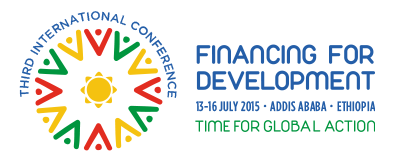The Asia-Pacific region could face between US$2.1 trillion and US$2.5 trillion per year in costs to close infrastructure gaps, expand basic social protection and address climate mitigation and adaptation in order to meet commitments under the post-2015 development agenda, according to a report published by the UN Economic and Social Commission for Asia and the Pacific (ESCAP) and launched on the margins of the Third International Conference on Financing for Development (FfD3).
 16 July 2015: The Asia-Pacific region could face between US$2.1 trillion and US$2.5 trillion per year in costs to close infrastructure gaps, expand basic social protection and address climate mitigation and adaptation in order to meet commitments under the post-2015 development agenda, according to a report published by the UN Economic and Social Commission for Asia and the Pacific (ESCAP) and launched on the margins of the Third International Conference on Financing for Development (FfD3).
16 July 2015: The Asia-Pacific region could face between US$2.1 trillion and US$2.5 trillion per year in costs to close infrastructure gaps, expand basic social protection and address climate mitigation and adaptation in order to meet commitments under the post-2015 development agenda, according to a report published by the UN Economic and Social Commission for Asia and the Pacific (ESCAP) and launched on the margins of the Third International Conference on Financing for Development (FfD3).
The report, titled ‘Financing for Transformation: From agenda to action on sustainable development in Asia and the Pacific,’ underscores that the region’s financing systems must be enhanced to maximize their potential and channel resources towards sustainable development. The publication explains that although Asia is home to more than 60% of the world’s extreme poor, it is well positioned to meet the costs of development given its high saving rates, build-up of foreign exchange reserves and ability to attract large capital flows and remittances. The report’s recommendations include: financial sector reforms for intermediation of development funds; social sector financing; climate finance strategies for adaptation and mitigation; trade finance and investment promotion policies; and enhancing the effectiveness of official development assistance.
The report launch was co-organized by ESCAP in partnership with the Asian Development Bank (ADB) and the UN Development Programme (UNDP), and included a panel of finance ministers, governors and private sector representatives. The panel presented policy recommendations which had been outlined during a regional consultation on FfD held in April 2015, where high-level representatives agreed on a financing strategy to harness the region’s financial resources for inclusive and sustainable growth.
Speaking on the occasion of the report’s launch, Shamshad Akhtar, ESCAP Executive Secretary, said the “skewed distribution of financial needs and resources across countries in the region” must be addressed to promote long-term financing and capital to support infrastructure investment and to prioritize sustainable development investment. She said the region, including poor households often excluded from the formal financial system, would benefit from improved access to financial services for small and medium-sized businesses.
In an op-ed, Stephen Groff, ADB, elaborates on development finance in the region, and the importance of private development finance sources, which dwarf the US$26 billion of official development assistance (ODA) delivered annually to developing countries in the region. Groff notes that two market failures must be addressed for the private sector to contribute positively to sustainable development: businesses must be convinced of the benefits of investing in developing countries in order to have a long-term development impact; and private funds must be invested in disadvantaged areas, rather than just in richer countries with stronger financial markets. He also highlighted private sector involvement in microfinance schemes, mobile banking, public-private partnerships, and a variety of benefits of private sector involvement in development, and called for closing the trade gap through, inter alia, microtrade programmes, which would allow more small- and medium-sized businesses to benefit from global trade.
Groff also called for: focusing on outcomes from private sector support, such as social impact bonds, which can help deliver quality public services; providing more incentives to the private sector to increase investment; and issuing local currency bonds to help protect financial systems from currency fluctuations. He said the ADB must help improve local financial regulations, and work with firms and investors to ensure a better comprehension of the benefits of local bond issuances. [ESCAP Press Release 14 July] [ESCAP Press Release 10 July] [Financing for Transformation: from agenda to action on sustainable development in Asia and the Pacific] [ADB Op-Ed] [ADB Press Release 10 July]